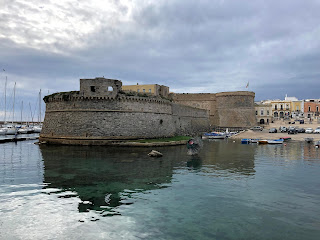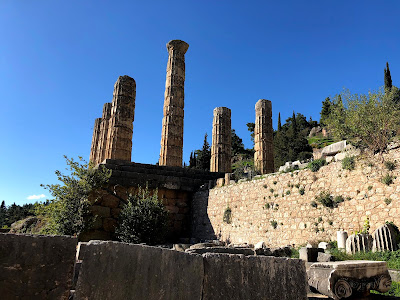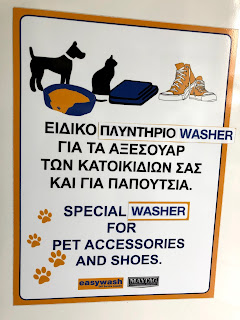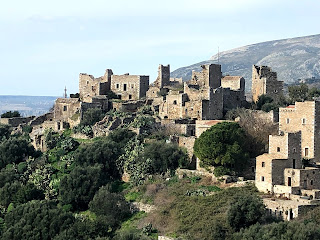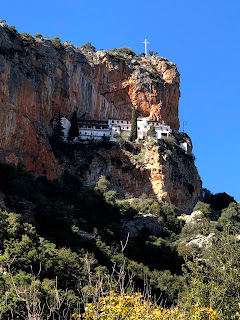The blog has been a little quiet since we returned from France somewhat precipitously in March. But as we enter national lockdown number three, there are encouraging signs that travel may be possible again before the end of 2021, if the roll-out of the vaccines is effective. If we can travel, we hope to return to Italy in the autumn. Driving the length of the country in two days was heartbreaking, but if nothing else it underlined how much we wanted to see some of the places we were speeding past. So many beautiful hill towns, the marvels and tragedy of Pompei, the familiar beauty of Umbria and Tuscany, and the staggering coastline of Liguria. One day we will get back there.
In the meantime we have been asked by several people for our advice if they wanted to do a similar trip, so this blog is primarily about the key questions you might want to pose if you wanted to follow in our footsteps.
What Vehicle?
Perhaps the biggest and most important question is what sort of vehicle, and this is very much down to the people involved. While travelling, we saw everything from cars with roof tents to vast American RVs, classic VWs to huge all-terrain vehicles designed to cross continents. Any vehicle will be a trade-off - do you want lots of space inside, or do you want a vehicle that can easy get down small lanes and up mountain passes? Do you want to be able to stop and wild camp almost anywhere, or do you want the security of being in a recognised site with lots of facilities? Will your budget allow you to pay high tolls for bridges, ferries and motorways, or do you need to keep costs as low as possible?

Elsa likes to drive a Chausson
For us the decision was partly made when we first chose Florence, and then cemented on a three month trip around France and Spain. It was after that trip that we knew we would do our long trip in the same van, and nothing larger. It would be impossible to list all the pros and cons of every type of vehicle in this blog, and we have never experienced some of the alternatives, so I shall simply explain why Florence was the right van for us. She's a 3.5 tonne Chausson motorhome on a Fiat Ducato chassis, 5.99 metres long with a drop down double bed which lowers from the ceiling at night. We saw one at a show in Staffordshire when we still had our previous (and first) van, Beverley, a 5.5m Autosleeper. We knew at once that this layout would deal with almost all the issues we had with Beverley. Let's take some of those considerations in turn.
Length: In our experience, 6m is pivotal length. You can park in an ordinary parking space provided that you can manoeuvre into the space and there is some possibility of hanging over the edge of it. We have rarely failed to squeeze in somewhere. You can drive down almost any road which appears on a map and which does not have a low bridge. That doesn't mean you don't need to look ahead and think twice about entering some small medieval villages, but it does mean that if you are on a through road, a bus route or somewhere with rubbish bins, you are probably okay. 6m is also the length which tends to take you into a higher price bracket for tolls and ferries, and that can mean paying half as much again, or more. The Øresund bridge, between Denmark and Sweden, for example, is currently €50 for a vehicle under 6m, and €100 for a camper between 6 and 10m.
We met a couple on a small stopover in Greece who were also spent the winter there, but had only been to a handful of places as they had a huge 9m van and were scared to turn off the main roads.
Of course, a smaller vehicle means less space inside, but we managed fine with two of us and two spaniels, and Nick is over 6'. It generally means that only one person can be moving around at a time, and storage is limited. But storage is also limited by weight.
Weight: If you are looking at a new (or new to you) motorhome, one of the key considerations is weight, and payload. Anyone can drive a van up to 3.5t, but you need a category C1 licence to drive a heavier van, and you will need to take a health check to carry on driving after the age of 70. As it happens, we both had C1 on our licences, but Nick has reached his three score and ten, and we didn't want the faff of medicals. There are vans over 6m but under 3.5t, but we think they are unrealistic as they will usually give you such a small payload that if you pack up for a long trip and get on board you will be instantly overweight. It is illegal to drive with a vehicle heavier that the permitted weight, fines can be severe, and your insurance could be invalid. Once we had decided that we didn't want to go over 3.5t, it was a no-brainer for us that we didn't want a van longer than 6m as it would be too tempting to overload it.
Storage: We think Florence's storage is pretty good: we have internal and external lockers, a hanging wardrobe in the bathroom, and plenty of space in the kitchen. You will always want more space than you have, but a 6m van forces you to think vary carefully about what you take. If you can't live with only three changes of clothing (plus some sportswear and extras for other seasons) then a smaller van might not be for you. You also need to be creative with cooking (amazing what you can do with six basic herbs and spices) and with how you pack and store things. Some of the best storage solutions we've seen have been in VW campers and converted panel vans, it's well worth looking at some of those just for ideas.
Fuel for heating, cooking and hot water: There are numerous options for heating you, your food and your hot water. Our aim is not to be dependent on electrical hook-up (EHU) if at all possible. If we are on a site with electricity, then we can use it for hot water, electronics, and charging up our leisure battery. We have nothing that uses three pin sockets - every device we have charges via USB or a 12V cigarette lighter socket (laptop). We had extra USB charging sockets put in Florence before our trip. We have two leisure batteries, and a solar panel on the roof to help charge them. They are also charged by driving, and we are in the habit of moving on regularly when not on EHU to help keep them charged up.
Most of the time we use our on-board gas supply for hot water and cooking. We had our Calor bottle replaced with a refillable system (Gaslow) which is topped up with Autogas/LPG. Finland is the only country in Europe without LPG fuel for vehicles, which meant we had to drive the length of the country in 12 days. There are other countries such as Italy and Greece which do not allow its use for cooking, and for that reason we have an external filler point which is indistinguishable from a vehicle fuel point. Some vehicles also use gas to heat the van, but we have a diesel powered system which uses fuel from our engine tank which is highly efficient and warm, but can be a little noisy. It heats with blown air, so it also requires some power to drive the fans, meaning you do need to keep an eye on battery levels when it's very cold.
Water: Florence has a 120 litre tank, which we find lasts four to five days if showering every other day. It does mean taking navy showers - turning off the water while lathering up, and then on to rinse off. We drink the water from the tank, but many people choose not to. The tap water we fill up with is safe in all of Europe, and we clean and disinfect our tank periodically, but it is a personal choice. We prefer not to buy bottled water, although we had to buy water twice in eight months when we were not able to find somewhere to fill up from a tap.
Some people do not use their showers, and smaller vans will not have an on-board shower. This would limit you to staying on a site with showers as often as you want to take a shower, although beach showers may be an option in some places and are frequently used by panel van travellers.
 |
| Posh Norwegian cassette cleaner |
Where to Spend the Night
This is another major consideration. Do you want to wild camp free of charge, are you prepared to stay on camperstops which may be anything from a basic car park to a small campsite, or do you only want to stay on campsites with full facilities? Budget will have the biggest impact on this decision, but it is also about the kinds of place where you want to wake up, and how concerned you are by being alone in an isolated place.
If you won't sleep for worrying about intruders or police visits, then there is little point in parking wild. If you can't bear the thought of not being able to unpack the camp chairs and get out the barbecue, then you will need to stay on campsites. But if you want the experience of parking in a quiet lay-by in the mountains, or waking up by a Nordic lake, then you'll need to be prepared to go off grid.
On our trip we used camperstops (Aires in France, Stellplätz in Germany etc) in countries where they are cheap and frequent (eg France), mandatory (eg Germany) or just convenient (eg Denmark). We almost exclusively wild camped in Scandinavia and the Baltic states which have a culture of free camping and places to empty the toilet cassette, and also in most of Greece. We spent two weeks over Christmas on a campsite in Greece, and on two other occasions during the four months we were there. We also stayed more than a few nights in car parks, and in parking provided by restaurants and pubs with the understanding that you will eat there. 
Check it's allowed to unpack the chairs
Apps: Whether you are opting for a mixed economy, exclusively wild camping, or staying on campsites, there will be an app to help you find somewhere. We found Park4Night suited us well, SearchforSites is also excellent, especially in the UK, France and Spain. There are better apps if you want to stay mostly on campsites, and it is worth considering an ACSI card which gives you reduced rates at campsites out of season. In all cases it is important to read the reviews and make an informed judgement. If youngsters frequently party all night and do wheelies in a car park, they are unlikely to refrain the night you plan to be there.
How Much it will Cost
I have encountered several people who vow that it's possible for two people to travel indefinitely for an average of £40 a night. Our experience was that over the eight months, half of which was spent in Greece, we spent just over £50 a night excluding major items, nearer £55 if you include a new battery and new brake pads. But that doesn't reflect the large difference in costs in different parts of Europe. We travelled quite quickly for the first couple of weeks to get up to Scandinavia, increasing the daily fuel cost. We also stayed at the most convenient camper stops, not necessarily the cheapest. So for the first part of our journey the average daily spend stayed relentlessly around £80. From Hungary to Greece it was substantially lower. This cost includes wine and food, but we only ate out about once a week, and that was often a café lunch rather than an evening meal. When we did stay at a campsite we were paying very cheap winter rates. We also spent very little on entertainment, chiefly on museums and sites which were more affordable than the £20 a head you can expect to pay in Norway. On average we drove about 45 minutes a day, so fuel costs were kept as low as possible, but were a considerable portion of the budget in some countries.
Where to go
Well, that's up to you. Brexit means you will be limited to 90 days in any 180 within the Schengen area, making a trip like ours rather more difficult. If you are new to motorhoming then I would strongly recommend spending some time in France to learn the ropes. It's one of the most Camper friendly countries, and will set you up well for travelling further afield. Do carefully research the law in any country you plan to visit. Wild camping is strictly illegal in Croatia, and is being made so in Portugal, which had previously been more accommodating. Having said that, wild camping is also illegal in Greece and Spain, but parking up and sleeping in your van is not. Sometimes it's about knowing the rules and how closely they are observed. Read some motorhome blogs, such as OurTour, think about how you want to spend your time, what you want to see and what your budget is, and take it from there.






















